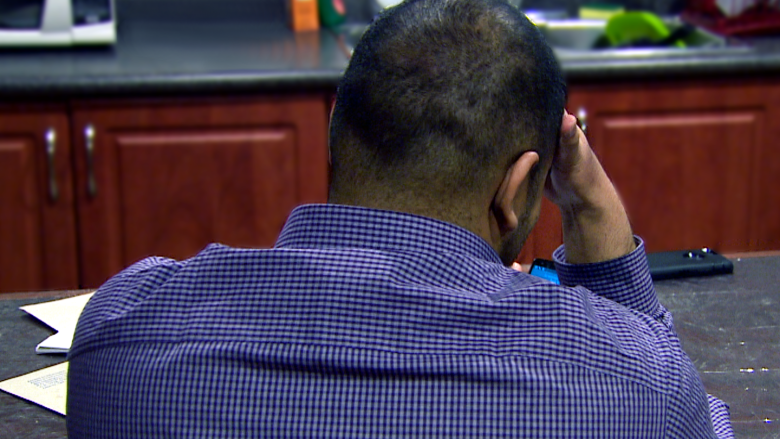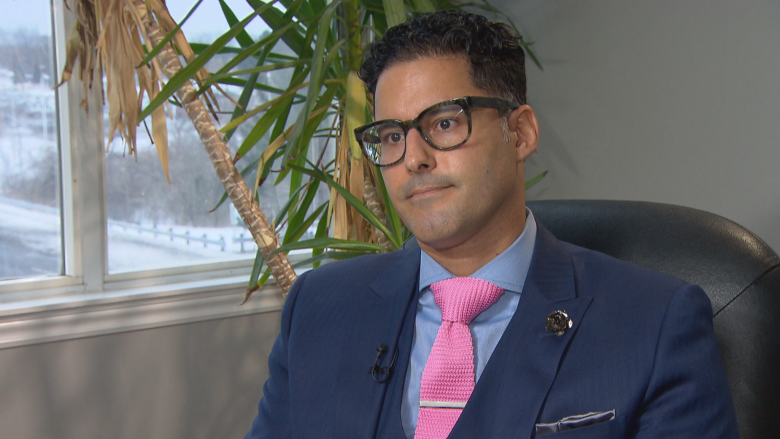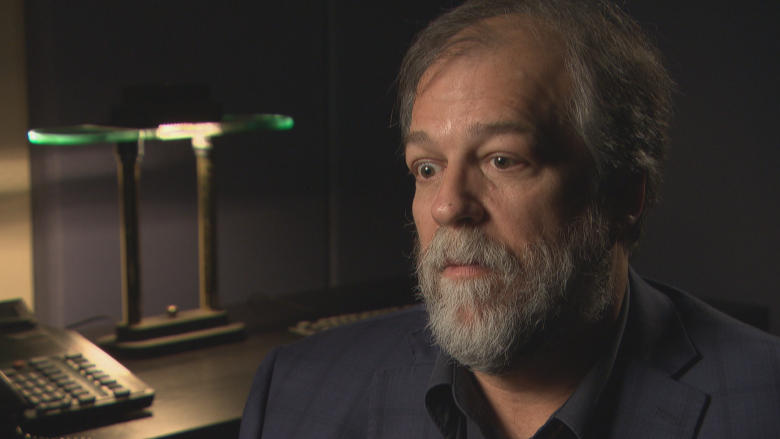'In the dark': Canadian eyed by CSIS blocked from visiting dying father in U.S.
In his basement apartment, a Mississauga man stares into his father's weary eyes for what could be the last time.
A tiny screen is the closest he can get to his 71-year-old father, bedridden in an Ohio hospital with Stage 4 brain cancer.
Travelling to see his father isn't an option for the 33-year-old. And he's reminded of it each time he tries to cross the border.
"Soon, inshallah [God willing]," he tells his father, unprepared for the alternative.
In 2014, after years of visiting his family in the United States without incident, the Muslim Canadian learned he was no longer allowed to enter the U.S., where his parents live, his father a green-card holder.
"My boarding pass wouldn't come out of the computer. I went to the desk, they said, 'Sorry, sir, you've been denied entry to the United States.' Without a reason," he recalled.
'Trying to prove a negative'
CBC News is not identifying the man because of concerns that coming forward could jeopardize his job in the technology-sales industry.
"I stayed at the airport that day for eight hours trying to find out why."
It was a question he'd asked himself since CSIS, the Canadian Security Intelligence Service, first expressed an interest in speaking with the organization he was with 10 years ago. He's still looking for answers.
While not guilty of any crime, the man says he is no longer treated like an otherwise innocent Canadian citizen — and has no way of knowing whether his border troubles are a result of being on the spy agency's radar.
Repeated requests for information from authorities have come back empty.
U.S. Customs and Border Protection would not specifically discuss the man's case.
In a statement to CBC News, it said applicants bear the burden of proof to show they are eligible to enter the United States. There are more than 60 grounds for refusal, spanning criminal convictions, health-related reasons and immigration violations.
Profiling on the basis of race or religion is strictly prohibited, it added.
The Canadian government won't comment specifically on the man's case, either.
2 years in Egypt
The man's situation doesn't come as a surprise to the National Council of Canadian Muslims, which says it's received 90 complaints about the spy agency or the RCMP's conduct in the last four years, largely from young Muslim men. It believes many people with complaints likely don't come forward.
What the man does know is that months before being refused entry to the U.S., he'd returned home from a two-year trip teaching English and studying Arabic in Egypt.
That was around the time the Muslim Brotherhood was taking power — but the man emphasizes he never got involved in politics.
Caveats like that abound when he speaks — the result, he says, of constantly feeling on the defensive. "I feel like I'm constantly trying to prove a negative."
When he returned to Canada in 2013, he says, officers with the Canada Border Services Agency pulled him aside for secondary screening. It was an exercise he says he'd go on to face again and again.
'We just want to ask you questions'
Within a week, he says, CSIS agents showed up at his home. He was out, and the visit left his landlord unnerved.
After he learned about the visit, he says he phoned CSIS and asked them not to come to his home unannounced again. He'd gladly meet them with a lawyer — something he couldn't afford.
In the spring of 2014, he flew to the U.S. to visit his family for what would turn out to be the last time.
The summer of that year, he tried to visit them for Ramadan. But a week before his trip, the spy agency asked to meet him again. He stood his ground. The next week, he wasn't allowed to cross the border.
By October, he decided it was time to meet with CSIS. Two agents met him at his lawyer's office.
"We don't have a problem with you, we just want to ask you questions about other people," he recalls them saying, before laying a set of photos on the table.
Around that time, headlines were blaring about a cluster of men from Calgary who'd left Canada to join foreign fighters in Iraq and Syria, among them Damian Clairmont, brothers Gregory and Collin Gordon, and Salman Ashrafi.
Born in Sarnia, Ont., the Mississauga man moved to Calgary with his family at 17. After his university years, he returned there and worked for the Alberta government until 2011 before leaving for Egypt.
"I was a Muslim youth volunteer at one point in time. I had known some people in passing but I had never actually heard from these people in their post-radicalization phase … I tried to make that absolutely clear" to the CSIS agents.
The nearly three-hour conversation spanned everything from his political views to who he may have crossed paths with.
"Just because you interacted with someone doesn't mean that you're guilty," he said.
The first time CSIS approached the man was while he was a public outreach co-ordinator for the Muslim Students' Association at the University of New Brunswick, as part of what the spy agency said was "community outreach." They met at a Tim Hortons on campus, and while the interview was friendly, the agents had specific questions about his political views.
'Especially troubling development'
The next time was in 2010, when he was organizing a conference as part of the Muslim Council of Calgary. All of the volunteers on the list had been contacted, he says. When he showed reluctance, he says the agents asked him, "Don't you want to be patriotic?"
It wasn't until 2014 that he says he learned CSIS was hoping to use him as a potential source.
For civil and criminal lawyer Mohamed El Rashidy, the frustration is all too familiar. And while it's impossible to draw a straight line from being pursued by CSIS to winding up unable to enter the U.S., he says, the pattern isn't uncommon.
"It becomes sort like a game of walking in the dark," El Rashidy says.
Under criminal law, he explains, a suspect is investigated, charged, has a right to a trial and, if found guilty, is punished based on that.
"In a national security context, without being charged, you are punished just by virtue of being a suspect, without transparency, without any information available to the individual or their lawyers," said El Rashidy, citing no-fly lists as an example.
"It's not uncommon for CSIS agents to say, 'We're here to ask questions, not answer them.'"
"And that is an especially troubling development that unfortunately the public has accepted."
'We'd be the loser'
Phil Gurski, a former CSIS strategic analyst, says it's impossible to say if the man's interactions with the spy agency are to blame for his border troubles.
It isn't part of CSIS's mandate to disclose details of their intelligence about a person who may be in their sights, and the U.S. has a right to allow who it wishes to enter the country, he says.
But, he acknowledges that, where Canada provides information to other countries, "in essence you kind of lose control over how the information's going to be acted upon."
Even when mitigating information becomes available, files shared with foreign partners are often not updated, he says.
"I would say it's really an unfortunate after-effect of the world post-9/11," he said. "If we were to opt not to share information based on the smallest possibility that someone might be refused entry to the States, for example, we'd be the loser in that deal."
Ihsaan Gardee of the NCCM doesn't disagree on the importance of maintaining national security, but argues Canada's Muslim communities "face disproportionate attention" in the process.
"It is no secret that since 9/11 that there has been hyper scrutiny of — and suspicion surrounding — Canadian Muslims as a potential 'fifth column.'"
No specifics from officials
While the Canadian government won't comment on the case, CSIS spokesperson Tahera Mufti says the agency has a duty to share "threat-related information" with foreign partners to "mitigate risks," and care is taken to strike "an appropriate balance" between intrusiveness and an individual's rights.
The rules around how such information is shared, says Public Safety Ministry spokesperson Scott Bardsley, were recently strengthened. In addition, a new independent review body will oversee CSIS and national security activities government-wide, including the border services agency and the RCMP.
A border services spokesperson said that the agency shares information with domestic and foreign partners in accordance with Canadian law, and anyone entering Canada may be subject to secondary inspections, regardless of race, nationality or religion.
"Referrals may be made for a number of reasons, and should not be viewed as an accusation of wrongdoing," the statement said.
'The only choice I have'
But while that may be, the man fears his chances of seeing his ailing father are dwindling. A letter addressed to the United States embassy from his father's oncologist requesting the son "be allowed to travel to the United States for humanitarian reasons" has been no help.
He was refused entry again in December.
"Keep on trying," his father tells him, his voice breaking.
"That's the only choice I have," the man says.
"I was always taught by my father to remain positive.… I have faith in God and in the Canadian and American people that they will try to let me in on grounds of compassion."





